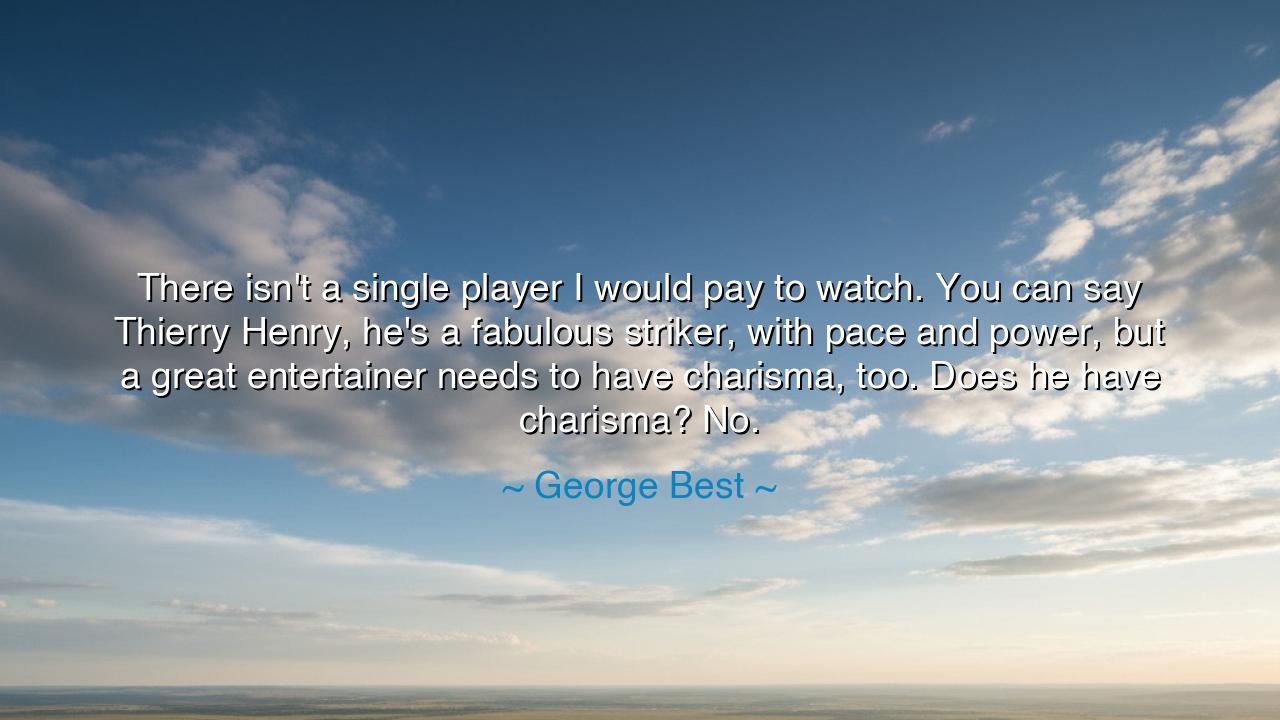
There isn't a single player I would pay to watch. You can say
There isn't a single player I would pay to watch. You can say Thierry Henry, he's a fabulous striker, with pace and power, but a great entertainer needs to have charisma, too. Does he have charisma? No.






“There isn’t a single player I would pay to watch. You can say Thierry Henry, he’s a fabulous striker, with pace and power, but a great entertainer needs to have charisma, too. Does he have charisma? No.” — George Best
These words, spoken by George Best, the golden idol of football’s youth and rebellion, reveal not arrogance, but a profound lament about the fading spirit of charisma in the game he once ruled. To the unwise, it may sound like pride; to the discerning, it is the cry of a man who remembers when the field was not just a place of sport, but a stage for art, courage, and joy. He speaks not of goals alone, nor of statistics or trophies, but of the fire of personality, that divine spark that makes one not merely skilled, but unforgettable.
For in the days of old, sport was more than a contest—it was a spectacle of the soul. The gladiators of Rome, the knights in the lists, the artists in the arena—all knew that skill must be joined with spirit, that victory without passion is hollow. George Best, a man of immense gift and tempestuous heart, lived this truth with every step of his youth. He was not content to play; he danced with the ball, he charmed the crowd, he breathed life into the game. When he speaks of charisma, he speaks of that magic which cannot be taught, only born within—the force that turns performance into poetry.
What he mourns, then, is the loss of individuality. He sees a world of athletes trained like soldiers—efficient, powerful, disciplined—but stripped of the wild, human flame that once made sport a form of art. In Thierry Henry, he sees greatness of body but not the same storm of spirit. And though Henry’s name will live in history for his prowess, Best’s words remind us that greatness of talent is not greatness of presence. The crowd may cheer the goal, but they remember the man who made them feel.
Consider the stories of the ancients. Alexander the Great conquered half the known world not only because he was a brilliant general, but because he shone with charisma—that rare force that made men follow him into the impossible. Likewise, in the world of creation, Mozart, with his laughter and audacity, turned music into living flame. Each of these figures possessed the same essence Best speaks of: that fusion of genius and personality, of mastery and magnetism, that moves hearts, not just minds.
The lesson, then, is not confined to the pitch. In every craft—in art, in teaching, in leadership—charisma is the breath that gives life to talent. The worker who performs his duty without soul becomes a machine; but the one who invests his labor with personality, humor, and daring becomes a creator. To play the game of life with charisma is to let the world see your inner light, unafraid of imperfection, unashamed of flair.
And yet, charisma is not vanity. It is authenticity made radiant—the courage to be oneself fully, joyfully, even when the world demands conformity. George Best’s life, both glorious and tragic, stands as a warning and a wonder: for his charisma burned so brightly it consumed him. Still, it reminds us that to live vividly, to create beauty that stirs others, is better than to live safely and be forgotten.
Therefore, O seeker, learn this truth: excellence without charisma is hollow, but charisma without discipline is fleeting. The balance of the two is mastery. Whatever your field, do not merely perform—express. Do not merely win—inspire. For long after the record books are forgotten, the world remembers those who brought not just skill, but soul, to their art. Be among them. Let your work not only impress the eye, but warm the heart—and in doing so, you will become not just a success, but a legend.






AAdministratorAdministrator
Welcome, honored guests. Please leave a comment, we will respond soon